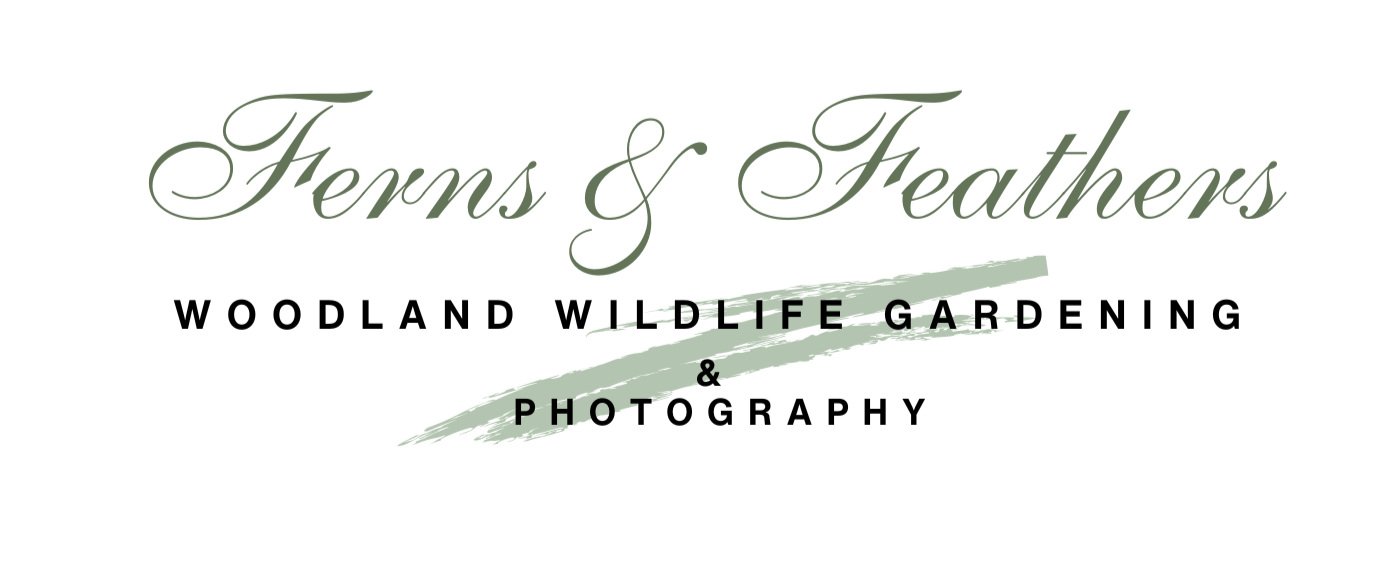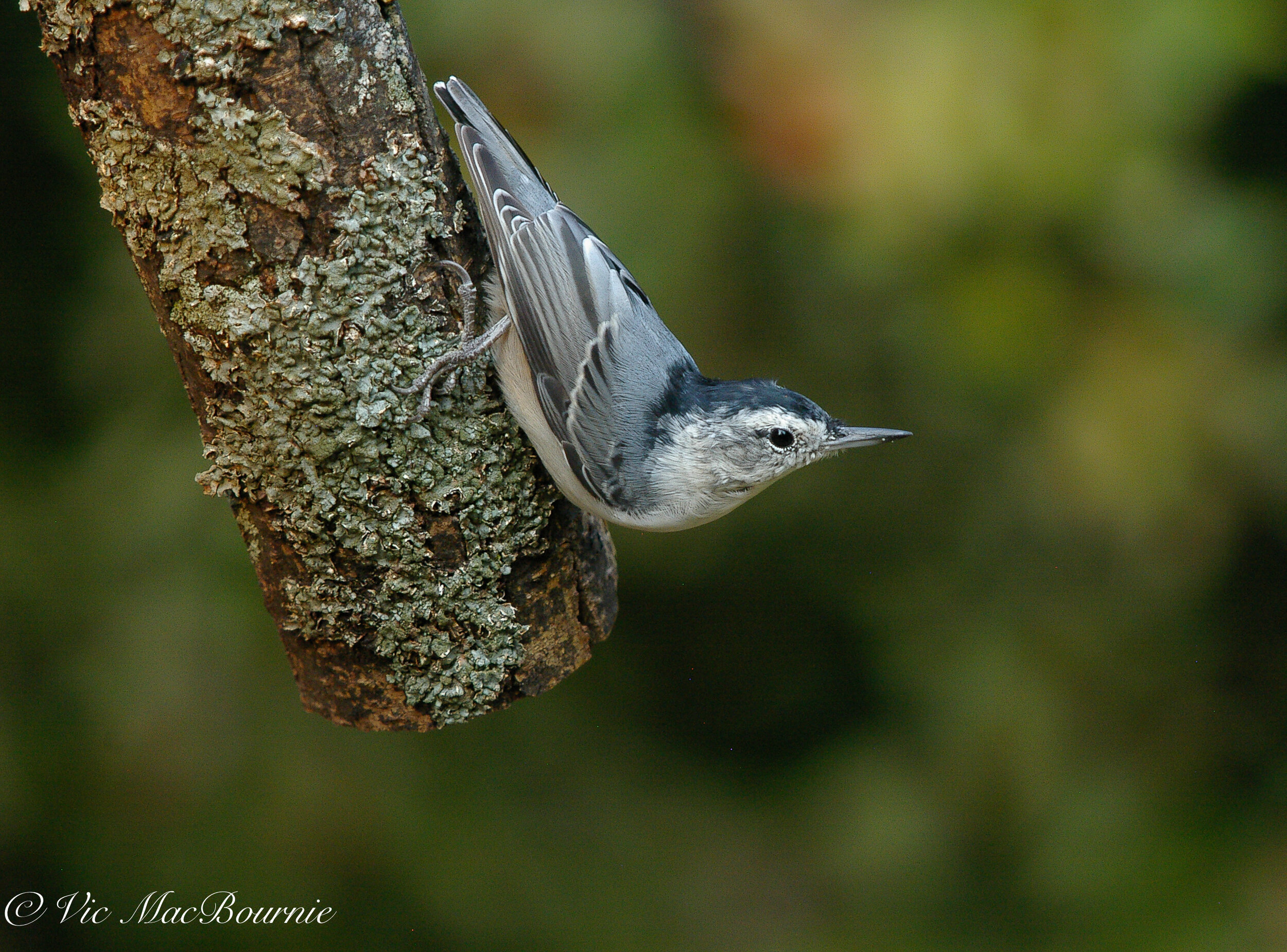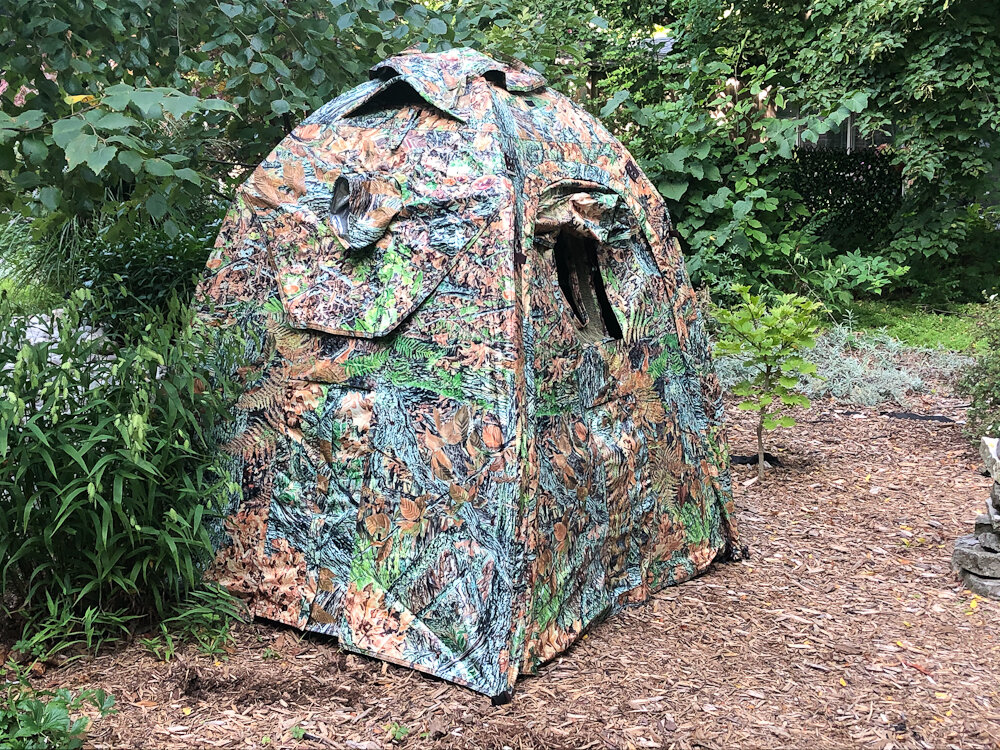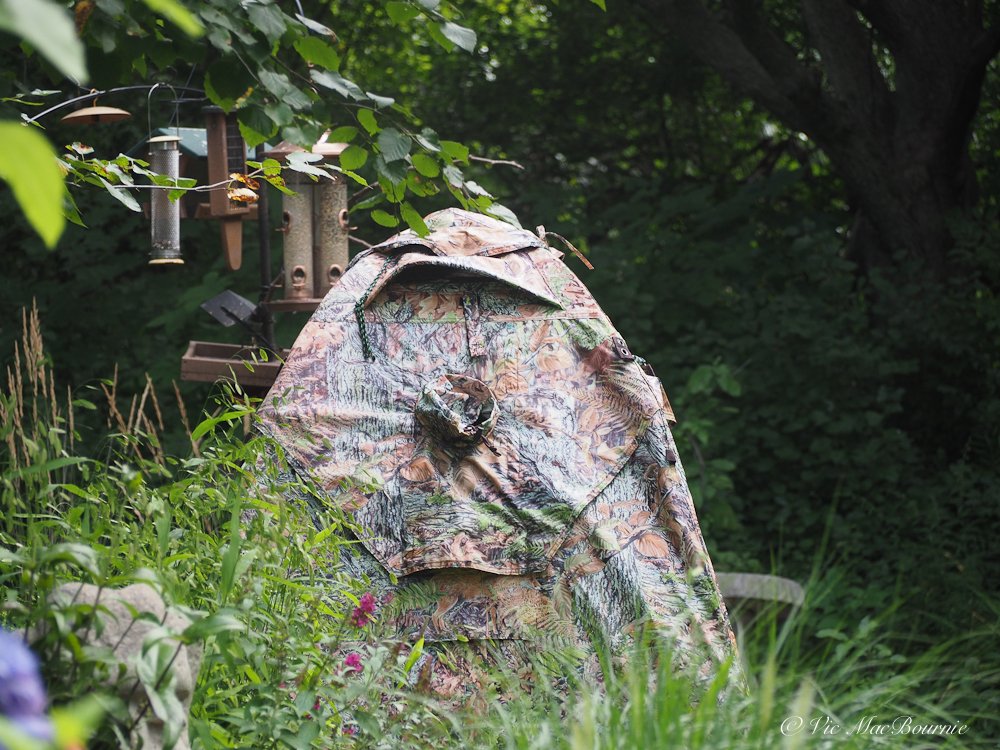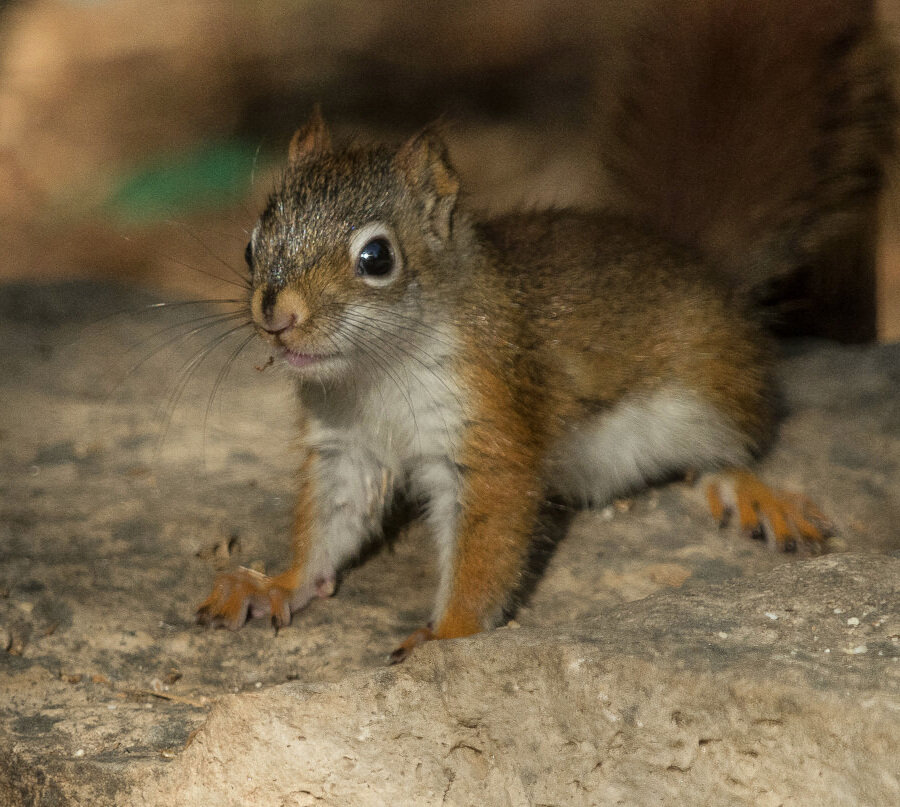Garden photography: Tragopan blinds help get you up close to backyard birds
The Tragopan blind allowed a close approach to this young fox who regularly visits the garden.
Memorable moments and favourite photographs
It’s not always about the photos, but when you nail the shot you’ve been trying to get for weeks, it’s always a good day.
And just about every day has been good since I landed a Tragopan V6 photographic blind.
Like I said, though, it’s not always about getting a good shot. One of the greatest joys I’ve experienced in the first full week of using the blind is getting the opportunity to experience our backyard birds and squirrels up close and personal. Observing the wildlife has been almost as much fun as photographing them.
White-breasted Nuthatch, taken from inside the Tragopan photographic blind.
I’ve even come to know a couple of the squirrels on a more personal basis. There’s the very timid little baby red squirrel who likes to hang out under the bird feeder but scampers up the pole and hides under the squirrel baffle at the least sign of danger. Then there’s the small female black squirrel who obviously has given birth recently and likes to hang out close to the blind.
The Tragopan V6 photography blind set up in the woodland garden.
This blind has given me new insights into the goings on in the backyard. At one point, a hawk flew over the yard and the birds and animals scattered in all directions. The yard grew completely silent and I noticed that all but one small Downy woodpecker found refuge. The little Downy clung motionless to the hanging feeder for at least 10 minutes until it felt the danger was completely gone. It was fascinating to watch from a mere 6-8 feet away.
It was just one of a host of memorable moments that I experienced since UPS delivered the one-person blind made specifically for photographers.
This image of a chipmunk was photographed with a compact camera equipped with a 112mm lens in the Tragopan blind.
How close can you get with a Tragopan blind?
I decided to put the Tragopan photo blind to a real test. How close could I get to wildlife using my Fujifilm X10 compact camera equipped with a mere 28-112mm lens. Of course, in the garden where many of the backyard wildlife are more accepting of me, it can be easier to get close. However, most wildlife photographers invest a lot of money in cameras and lenses that enable them to get up close.
Good planning is critical to successful wildlife photography and be combining the Tragopan blind and my outdoor nature reflection pond, I was able to capture the above image of the chipmunk. In the same photo session, a bluejay also paid me a visit.
So, even if you can’t afford an expensive lens, a Tragopan photo blind might just be all you need to get in close to backyard wildlife.
Many memorable moments in the blind
The other memorable moments have been digitized on photo cards and now sit proudly in Lightroom’s digital database on my computer’s hard drive. There are the woodpeckers, the blue jays, the white-breasted nuthatch, red-breasted nuthatch, the many squirrel shots and chipmunks. In exactly one week in the blind, my success ratio of good shots is through the roof.
I’ve never owned a blind. The closest I’ve come to using one was the purchase of a camo throw that I used to try to photograph deer at a local conservation authority years ago. I tucked it away in tall grass under a tree thinking it was a safe hiding place only to come back the next day to find it gone.
So, this is a new experience for me.
My Tragopan blind set up near the bird feeders in a corner of the yard. The Tragopan blind is an essential photographic accessory that works as well in the garden as it does in the field.
(If you are interested in exploring garden photography at a higher level, be sure to check out my comprehensive post on the Best camera and lens for Garden Photography.)
I could write about the high build quality of the blind. The fact that everything is double stitched, and that the inside has a silver thermal lining that keeps out the heat of the sun, holds in the warmth in fall and winter and blocks any movement in the blind especially when it is backlit. I could write about all the small things that, unlike a blind made for hunting, makes this blind perfect for photographers.
One of our baby red squirrels looking as cute as ever. The photo blind makes getting pictures like this much easier without the need for extremely long lenses.
And did I say that the blind is built specifically for photographers. It is NOT a hunting blind converted for photographers. Ethically, that makes me feel a whole lot better.
“Designed for photographers by photographers” is how Tragopan describes their line-up of blinds. “We’ve tried to think of everything you’ll need to stay concealed and keep yourself and your subject comfortable. Our goal is to make your job of creating great images easier.”
It’s no surprise that one of the company’s goals is to make our job of creating great images easier. What I love, is that one of their goals is also to keep your subjects “comfortable.” I can’t imagine a hunting blind that would make that claim.
I could go on about what makes this blind better for photographers than even the best “hunting” blinds, but I’m not sure readers of this blog need all those details in this post. (There will be other more detailed reviews later.)
The real question for readers here is: who needs this blind and why?
You might think that only dedicated wildlife photographers would go to the trouble of buying a photo blind. In this age of social media, however, many of us are looking for simple, inexpensive ways to improve our Instagram and Facebook posts. Many of us just want to document our gardens and the birds and animals that either call it home or visit it on a regular basis.
Let me say that there might not be a better photographic tool than a blind to improve your backyard bird and wildlife photography, especially if your photography equipment is limited to a few kit lenses and your longest telephoto is a 70-200mm zoom.
There are basically two ways to get closer to your subject. Either buy a longer lens in the realm of 300-400mm for several thousand dollars, or figure out a way to get closer to your subject.
The Tragopan blind made getting this image of a young fox possible.
The blind gets you a whole lot closer for under $300. And because it’s small and light, (sets up in less than a minute or two) it can be easily moved anywhere in the yard or taken out into the field to photograph or observe a host of other subjects.
One of the benefits of photographing in our yard is that many of the birds and wildlife are already accustomed to our movements and accept a closer approach than they would in the wild. But there are many birds and backyard wildlife that do not allow a close approach. The blind not only allows your subjects to become more comfortable, it also allows a close approach to more skittish birds and wildlife. You might be able to get a shot of a bold little chickadee without a blind, but what you really want is a closeup of the sparrow hawk that visits every afternoon looking for dinner.
And, because the blind is mostly used in your yard, you can leave it up for days, even weeks without worrying about someone walking off with it. Set up and tear down is is so easy that I simply store my blind in the shed overnight and pop it up in the morning or evening when I want to use it.
A photographic blind may not be for everyone, but for anyone interested in improving their photography, whether it’s to take their hobby to a higher level, or just to document the wildlife in the yard for their social media accounts, a photographic blind might be the ideal investment.
I hope to use the blind to get photographs of fox, deer, wild turkeys and more. Stay tuned for future posts on how the Tragopan performs under different conditions throughout the fall into winter and finally into the spring months.
For more information on Tragopan Photographic blinds, go to www.photographicblinds.com. or just click on to one of these links.
* I want to disclose that Tragopan Photographic Blinds have provided me with a blind to use for a period of time to test and review. I was required to pay delivery costs of the blind and GST. In no way have they required me to write positive reviews of the product.
• This page contains affiliate links. If you purchase a product through one of them, I will receive a commission (at no additional cost to you) I try to only endorse products I have either used, have complete confidence in, or have experience with the manufacturer. Thank you for your support. This blog would not be possible without your continued support.
